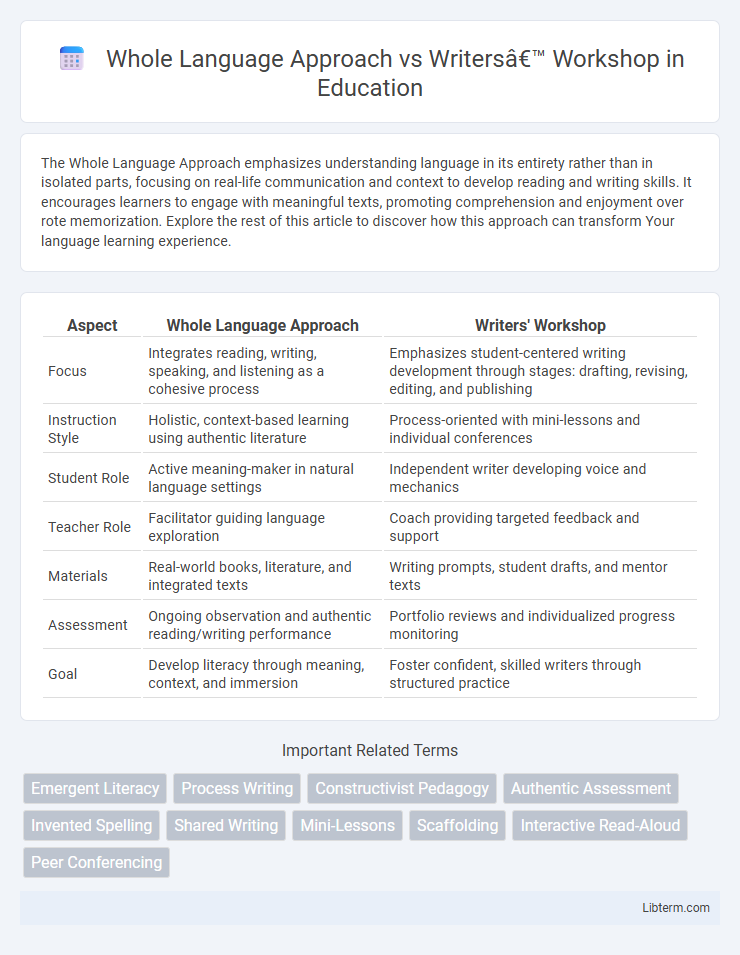The Whole Language Approach emphasizes understanding language in its entirety rather than in isolated parts, focusing on real-life communication and context to develop reading and writing skills. It encourages learners to engage with meaningful texts, promoting comprehension and enjoyment over rote memorization. Explore the rest of this article to discover how this approach can transform Your language learning experience.
Table of Comparison
| Aspect | Whole Language Approach | Writers' Workshop |
|---|---|---|
| Focus | Integrates reading, writing, speaking, and listening as a cohesive process | Emphasizes student-centered writing development through stages: drafting, revising, editing, and publishing |
| Instruction Style | Holistic, context-based learning using authentic literature | Process-oriented with mini-lessons and individual conferences |
| Student Role | Active meaning-maker in natural language settings | Independent writer developing voice and mechanics |
| Teacher Role | Facilitator guiding language exploration | Coach providing targeted feedback and support |
| Materials | Real-world books, literature, and integrated texts | Writing prompts, student drafts, and mentor texts |
| Assessment | Ongoing observation and authentic reading/writing performance | Portfolio reviews and individualized progress monitoring |
| Goal | Develop literacy through meaning, context, and immersion | Foster confident, skilled writers through structured practice |
Introduction to Whole Language Approach
The Whole Language Approach emphasizes learning language through meaningful, authentic texts, promoting reading and writing as interconnected processes. It prioritizes context and comprehension over isolated phonics instruction, encouraging students to derive meaning naturally from rich literature. This approach contrasts with more structured methods by fostering a holistic, immersive language experience.
Foundations of Writers’ Workshop
Writers' Workshop is grounded in student-centered instruction, emphasizing authentic writing experiences and individual voice development through mini-lessons, independent writing time, and sharing sessions. It integrates processes such as brainstorming, drafting, revising, editing, and publishing, supported by teacher modeling and peer collaboration. This approach builds on constructivist foundations, promoting metacognition and self-regulation to foster lifelong writing skills.
Core Principles of Whole Language
The Whole Language approach centers on teaching literacy by integrating reading and writing through authentic, meaningful texts, emphasizing comprehension and context rather than isolated skills. Core principles include learner-centered instruction, the use of real literature, and fostering a love for language through natural language experiences. This approach contrasts with the Writers' Workshop model, which focuses more on structured writing processes and individualized feedback.
Key Elements of Writers’ Workshop
Writers' Workshop emphasizes a structured, student-centered environment where mini-lessons, independent writing, and peer conferencing drive skill development and creativity. Key elements include explicit instruction on writing craft, time for sustained writing practice, and individualized feedback to support revision and growth. This approach fosters writer identity and autonomy through continuous modeling, sharing, and reflection within a collaborative community.
Comparing Teaching Strategies
The Whole Language Approach emphasizes holistic literacy development through immersion in authentic texts, fostering reading and writing simultaneously within meaningful contexts. Writers' Workshop centers on structured writing instruction, incorporating explicit teaching of writing skills, peer collaboration, and individual writing conferences to improve composition abilities. Comparing these strategies, Whole Language prioritizes natural language acquisition and comprehension, whereas Writers' Workshop focuses on systematic skill development and iterative writing practice.
Student Engagement and Motivation
The Whole Language Approach fosters student engagement by immersing learners in authentic reading and writing experiences that emphasize meaning and context, enhancing intrinsic motivation. Writers' Workshop motivates students through structured, student-centered writing processes that encourage creativity, choice, and peer collaboration, leading to increased ownership of their work. Both methods prioritize active participation but differ in their focus, with Whole Language promoting holistic literacy and Writers' Workshop emphasizing iterative writing development.
Assessment Methods in Both Approaches
The Whole Language Approach emphasizes holistic assessment methods such as portfolios, anecdotal records, and student self-reflections to evaluate comprehension and language use within meaningful contexts. Writers' Workshop incorporates formative assessments, including conferencing, peer reviews, and iterative drafts, to monitor and support the writing process and growth in skills. Both approaches prioritize authentic, process-oriented assessments over traditional standardized tests, aiming to foster student engagement and individual progress.
Benefits and Limitations
The Whole Language Approach promotes literacy by integrating reading and writing naturally within meaningful contexts, fostering comprehension and critical thinking skills, but it may lack explicit instruction in phonics, which can hinder early decoding abilities. In contrast, the Writers' Workshop emphasizes structured writing practice, peer review, and individualized feedback, enhancing students' writing fluency and creativity, though it might not sufficiently address reading strategies or phonemic awareness. Both methods support student engagement but require balance to ensure comprehensive literacy development.
Classroom Implementation Tips
Classroom implementation of the Whole Language Approach emphasizes immersive reading and writing experiences, encouraging students to explore authentic texts and express ideas through meaningful communication; teachers integrate reading, writing, speaking, and listening across all subjects. Writers' Workshop centers on structured writing time where students draft, revise, and share their work with peer and teacher feedback, fostering a supportive community and personalized instruction tailored to individual writing development. Effective strategies include creating print-rich environments for Whole Language and using mini-lessons to target specific writing skills within Writers' Workshop.
Choosing the Right Approach for Your Classroom
Selecting the right literacy instruction method depends on classroom goals, student needs, and teaching style. The Whole Language Approach emphasizes immersive reading and writing experiences that foster natural language acquisition, while Writers' Workshop targets structured writing practice with personalized feedback to develop writing skills. Evaluating student engagement, literacy proficiency, and curriculum standards will guide educators in integrating the most effective approach for optimal learning outcomes.
Whole Language Approach Infographic

 libterm.com
libterm.com